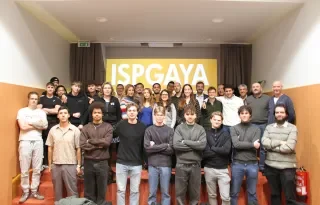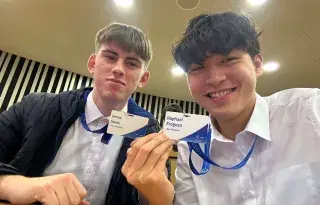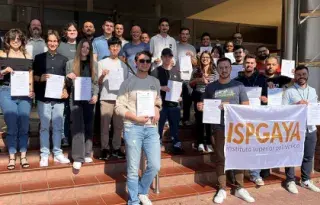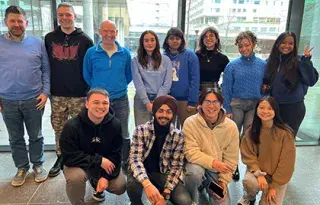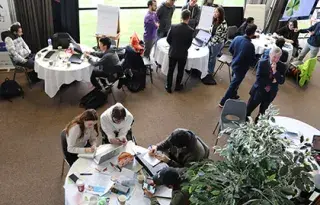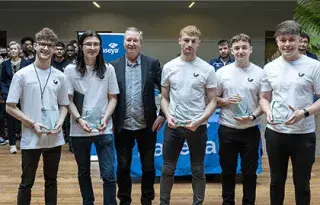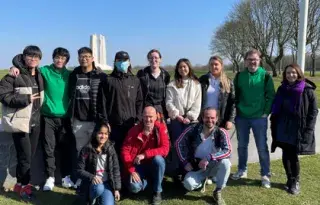BSc (Hons) in Computing in Software Development
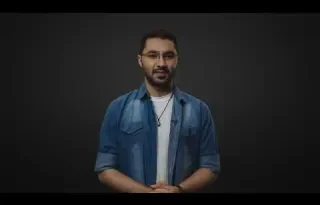
Search to find a different course
Course Overview
This course provides a solid foundation in software development for web and mobile systems, and how to test and implement it into group projects. Critical thinking and communication skills are taught to provide students with the core soft skills required to work as part of a modern software engineering team. Students will specialise in the design, development, testing and evaluation of software systems with particular emphasis on the application of agile process development.
Students will also acquire the fundamentals of a broad range of computing topics; networking, procedural and object-orient programming, testing, computer security, data analysis and visualisation, IoT, and will have the option of selecting specialist modules such as: artificial intelligence, machine learning, mobile development, smart technologies, and immersive technologies.
What makes this course different
Work Placement
In 3rd Year (Semester 2) students undertake a minimum of 15 weeks of work placement with host companies.
Graduate Salary Potential
91% of graduates are in employment after 6 months. 73% of graduates are earning €30-€50k after 6 months of graduating.
Necessary Qualification
84% of graduates said their qualification was an advantage or a formal requirement - (DkIT/HEA Graduate Survey)
Understanding the Industry
Software development is at the heart of every sector, from business and computing to healthcare and entertainment. It combines creativity and problem-solving to create innovative solutions for our modern lives. The industry is continuously progressing and innovating, and needs software developers with a passion for the art of designing, installing, and supporting software.
Career Opportunities
As a graduate of this course, you will have a skill set that will enable you to gain employment in industries in which there is a constant demand for software developers, particularly in the ever-expanding Internet sector.
Future Careers:
- Software Engineer
- Application Developer
- Software Tester
- Web Developers
- Cloud Computing Developers
- Technical Consultants
Graduates work at
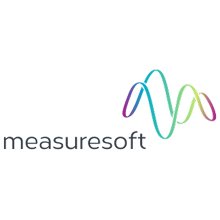
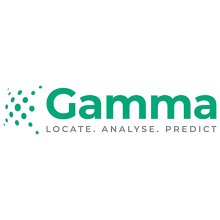
Course Delivery and Modules
This course is delivered in a combination of lectures, lab classes and tutorials. There is a specific focus on problem-based learning and so much of the programme content is delivered in small 20-student computer labs where students can avail of greater feedback and interaction with their lecturer.
There are numerous support services available within the department to enable and encourage all students to realise their personal and professional potential. Elective module choices in the final year of the programme allow students to focus on the discipline that they intend to pursue as a career after graduation.
- Programming
- Web Development
- Computer Architecture
- Mathematics
- Personal and Professional Development
- Applied Software Development Principles
- Database Systems
- Introduction to Networking
- Intensive Project Abroad (Optional)
- Object-Oriented Programming
- Full Stack Development
- Software Testing
- Mathematics
- Database Systems
- Computer Security
- Applied Software Project Management
- C++
- UX Design
- Server-side Development
- Intensive Project Abroad (Optional)
- Universal Design Project
- Data Science
- Mobile Integration
- IoT Development
- Algorithms and Data Structures
- Intensive Project Abroad (Optional)
- Work Placement (15 weeks) OR Approved Semester Abroad
- Legal and Ethical Issues in Computing
- Research Methods
- Secure Systems
- Collaborative Project OR Project
- Entrepreneurship
- Data Analysis and Visualization
- Intensive Project Abroad (Optional)
Electives
- Immersive Technologies
- Artificial Intelligence
- Smart Technologies
- Service Oriented Architecture
- Human Factors in Design
- Machine Learning
- Heterogeneous and Parallel Computing
- Mobile Development
Work placement
In 3rd Year (Semester 2) students undertake a minimum of 15 weeks of work placement with host companies.
The host companies are provided by the department in coordination with the Placement Office or students can undertake a placement with an appropriate company which they have identified themselves.
Education Progression
Graduates with a satisfactory level of achievement may be able to undertake postgraduate (HDip/ Masters/PhD) studies. Postgraduate research opportunities, either research masters or PhD are also available at DkIT.
MSc in Computing in Computer Animation
MSc in Computing in Medical Device Software Engineering
Fees and Funding
Please find information on fees and funding here: www.dkit.ie/fees
Entry requirements
Standard entry requirements apply. There are no special entry requirements for this course.
- Standard Requirements for Leaving Certificate Applicants
- Standard Requirements for UK/NI Applicants
- Standard Requirements for QQI-Further Education Applicants
- Mature Applicants: Minimum of 23 years of age on January 1st of year of application.
Recent CAO points
How to apply
Apply on CAO
All standard entry first-year applicants must apply for entry through the CAO. See Important application dates for CAO and information for specific applicant types below:
Advanced Entry & Transfer Applications
Advanced Entry is for applicants who have previous educational achievements and/or work experience and want to be considered for direct entry into year 2, 3, or 4 of a course. This includes students looking to transfer to DkIT from another Higher Education provider.
International Application (non-EU)
International Applicants (not from or living in the EU) can apply through an agent or directly to DkIT to study this course.
Ask us a Question
If you have a question about the BSc (Hons) in Computing in Software Development please ask it below and we will get back to you.
Department Office
Course News
View all NewsDisclaimer: All module titles are subject to change and for indicative purposes only. All courses are delivered subject to demand and timetables are subject to change. Elective Module options will only run subject to student numbers. The relevant Department will determine the viability of each elective module option proceeding depending on the number of students who choose that option. Students will be offered alternative elective modules on their programme should their preferred elective option not be proceeding. Award Options for Common Entry Programmes: The relevant Department will determine the viability of each award option proceeding depending on the number of students who choose either option. If the numbers for one of the Award options exceed available places, students for this option will be selected based on Academic Merit (highest grades).

